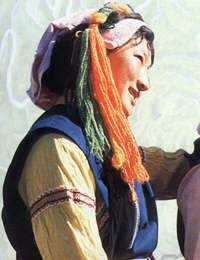Source: China Daily
09-21-2006 15:16

The Nu ethnic minority, numbering some 27,123 (by 1990), live mainly in Yunnan Province's Bijiang, Fugong, Gongshan and Lanping counties, which comprise the Nujiang Lisu Autonomous Prefecture. Others are found in Weixi County in the Diqing Tibetan Autonomous Prefecture.
The Nu people speak a language belonging to the Tibeto-Burman the Austronesian of the Chinese-Tibetan Phylum. It has no written form, and, like many of their ethnic minority neighbors, the Nus used to keep records by carving notches on sticks. Educated Nus nowadays use the Han language (Chinese).
The Nu is an ancient tribe that originally lived on the banks of the Nujiang and Lancang rivers. Historical records show that they are the descendants of both the aborigines, called Along or Anu, who inhabited in the Gongshan and Fugong areas during the ancient times and the Nusu people immigrated to Bijiang and Lushui from the east of Lijiang River and Jianchuan. These two tribes intermingled and intermarried, finally giving birth to a new group -- Nu, but some distinctive characteristics of each group are still preserved. With the founding of the PRC in 1949, it was official named the Nu ethnic minority.
The Nu people are mainly engaged in agriculture, but also hunt and gather wild plants. Their main crops include corn, buckwheat, barley, potatoes and beans. Some Nu people support themselves through cottage industries such as weaving, wine brewing, iron forging, etc.
Both men and women like drinking. They are especially adept at brewing wine. When a distinguished guest comes, they always entertain him with good wine. If they regard the guest as a bosom friend, they ask him to drink the "one-heart wine". Face to face, mouth to mouth, one hand on the other's shoulder, the host and the guest are to share the same cup of wine. The "one-heart wine" is a symbol of the Nu people's profound sentiments of friendship. A guest becomes their real friend only after he has drunk it.
The Nus were animists, and objects of worship included the sun, moon, stars, mountains, rivers, trees and rocks. In addition, Lamaism,Catholicism and Christianity had made some headway among the Nus before liberation.
Traditional festivals celebrated by the Nu people include the Jijiamu Festival, the Fairy Festival, etc. The Fairy Festival, also called the Flower Festival, is a traditional festival celebrated on March 15th (lunar calendar), and lasts for three days. The Jijiamu Festival is the Spring Festival of the Nu people, which lasts about 15 days from the end of lunar December to the beginning of lunar January.
Editor:Lu Yuying
